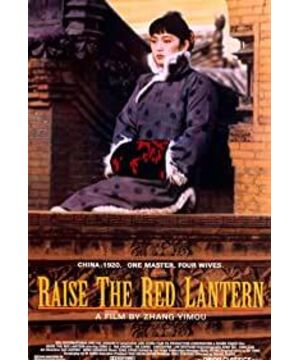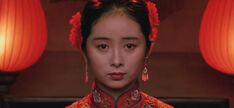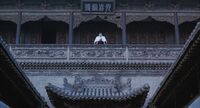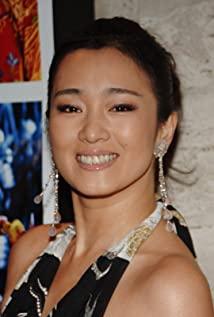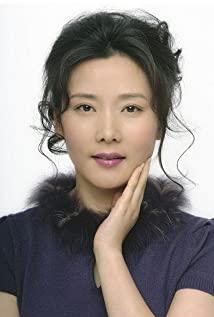I must have seen the original "Wives and Concubines" in "The Big Red Lantern", but like most of Su Tong's short stories, I can't remember it clearly. I only vaguely remember that there were wells, women, and Songlian. I always have doubts about the ability of contemporary novelists to control novels. Taking Su Tong as an example, "Mi" shows a little powerlessness. When I came to the new work "River Bank", I couldn't bear to read half of it. Reading, he is still short stories with dense refreshing.
It may also be related to my low awareness.
Watching Zhang Yimou's film "High Red Lanterns" directed by Zhang Yimou in the year I was born across the barrier of time, there is a bit of a funny feeling in the isolation and ambiguous emotions, because today we have been fed by Laomouzi's Chinese routines Satisfied, Aunt Gong Li's "Oriental Beauty" was also dubbed "Asiatic Mistress" by me, so much has been written about by the age and the media, so that while Songlian lowered her eyelids, she answered flatly in Gong Li's mature voice, "I am nineteen this year. ', I almost burst out laughing.
Obviously, this is a woman's play, and even the most powerful shots of Mr. Chen in the family are mostly a drop in the distance. Originally, five women who had their own ghosts were fighting for men, but because of women's "going off topic" habit, the men disappeared from the battlefield and became fighting for themselves -
the eldest wife for the palm of her hand. The door authority and the second wife do not suffer any loss in order to gain all the benefits, the third wife is free for the sake of having a woman, and the fourth wife fights to fight against the first three—you see, she first entered the Chen family Even if she glanced at the sedan chair, carried her suitcase and walked into the door, she still wore that "foreign student" uniform even after she went crazy. Her "consciousness of progress" and "intelligence" were almost the first to decide whether she would be with her. In this old house, the "child corpses in the wine vat" fought to the end, and she was responsible for the calculations and conspiracies of the wives. I don't think she was willing to sit idle.
There is no spring in the film. In the summer, Songlian entered Chen's house, in the autumn, the second wife won Songlian's favor, in the winter, Mei Shan died, and in the next summer, she married the fifth wife - what about spring? How did the big family in this "ghostly mansion" escape the murderous and energetic Haruhi? In addition to the high walls, thick tiles and red lanterns, this family house does not even see flowers and plants. They hide in the scorched yellow tones of dust and live and maintain their own prestige. They are afraid of spring. Only when Mei Shan was tied into the dead man's house and "hanged" did the Hammer-footed Second Aunt Cao reckon with Song Lian's torture. "Winter is here, can spring be far behind?" Spring (in the future) is a threat to the Chen family, second only to death. Even the "red lantern", the carrier of "brightness" that belongs to the future, still faintly points to the deformed sex and night.
The meaning stacked on the "red lantern" is also enough to recall. In a woman's play in which male characters are vaguely portrayed, when men appear as passers-by, housekeepers, and servants, the "red lantern" instead becomes a symbol and stand-in for men's power, almost stubbornly antagonizing and tearing the times in the "house rules" model. The masculine space under scouring——then the "red lantern", which is full of feminine tranquility, silence and mysterious temperament, is the male "authority" squeezed again by cause and effect——Hu Lancheng said, "Women are related to the world. Strategies, my husband is today’s spiritual teacher”, realizing that the emotional wrestling between people (not between Sifang’s wives, including maids and masters, servants and servants) is always women, and it is women who see ghosts. Silently dying or going crazy for it, the man immediately continued with the fifth wife. In other words, the movie reflects the persecution of women by the "feudal system", but I should shamelessly mention the majestic, sensitive, and meticulous "connotation" of women.
I also remembered the so-called "symbiotic relationship" between aphids and ants, between people, whether it is "multicultural" or "separation" between people, it is not as complicated as "symbiosis", a few women. The intriguing women are arguing, but their lips and teeth are cold. The death of the maid Yan'er can also catch up with Song Lian and Mei Shan like a butterfly effect. What do you think will be the next life of Zhuo Yun and the eldest wife? No one can say bad. The "symbiosis" between women is so solid and solid, unlike the almost deliberate, thick-line, hormonal and somewhat false color of "loyalty" in the "friendship" of men.
The last thing to say is that He Saifei's third wife really amazed me. Gu Pansheng's dangling eyes, thin lips that are always wary, and dense temples, matched with the figure and eyebrows of singing, the swaying arrogance between her gestures and gestures With the stingy, slightly out-of-the-ordinary "Hang Pu" reciting in white, it is really amazing.
(Actually, I wrote so much mainly to emphasize the last point. In fact, I was going to start the computer to write Li Bai's thesis, but I accidentally made HIGH nonsense in a short time and at a high speed. I am a cheap hand.)
View more about Raise the Red Lantern reviews


